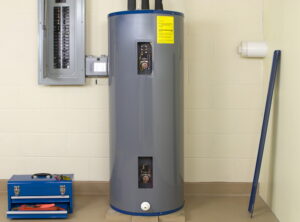Before we answer your question, we have a question to throw back out at you–do you know what “hard water” is?
Many homeowners have heard the term but don’t necessarily understand what it is, or how it impacts their quality of life. Hard water is water that has a high level of minerals in it–namely calcium and magnesium. These minerals are harmless to ingest but aren’t so great for your plumbing system.
They lead to a process called scaling, which is when deposits get left behind, sticking to the insides of your pipes and plumbing appliances, and water heaters often fall victim.
For this reason and more, we recommend that our customers schedule professional water heater maintenance at least once a year. Read on to learn more about the problem of scaling and how maintenance can help!
How Deposits Get Left Behind in your Plumbing and Water Heater
You’ve likely noticed a flaky white or yellow buildup around faucet handles or drains at some point. This is the direct result of scaling–the deposits that get left behind due to hard water buildup. These minerals can’t just simply drain away as easily as the rest of the water does, and they can cling to metal surfaces even as water rushes through.
As a result, the scaling gets lodged in the pipes, including those that lead in and out of the water heater, and also they settle at the bottom of the water heater tank.
How Scaling Damages Your Water Heater
Scaling impacts your water heater in a variety of ways. For starters, the buildup can form in the pipes, and effectively block the water from moving through if it develops a thick enough layer of deposits.
More commonly, however, the inside of the water heater tank gets damaged from the scaling. Mineral deposits build up at the bottom of the tank, making it harder for the system to evenly heat the water, and the decreased efficiency results in the pressure levels of the tank becoming unbalanced.
Even worse, the minerals rattle around at the bottom of the tank and can force it to corrode.
Signs of Scaling
Maybe the biggest sign that scaling is impacting your water heater is the sound it makes when mineral deposits rattle around inside the tank. This sound is usually described as popping or even a knocking noise.
This happens as steam bubbles attempt to escape past the layer of sediment at the bottom of the tank. Scaling can also impact the temperature of the water. This is especially true with tankless water heaters, as the deposits coat the heat exchanger and make it harder for water to pick up the heat.
You may also notice low hot water pressure if scaling starts clogging up the pipes that lead out of your water heater.
So What Does Maintenance Do?
Professional water heater maintenance allows us to flush the tank, getting rid of the scaling that could cause the above-mentioned problems. This gets your water heater back to normal!
Also, in the case of a tank water heater, maintenance gives us a chance to check on the anode rod, an important water heater component that absorbs rust and corrosion so the rest of your tank doesn’t.
The best way to prevent unexpected water heater repair in Moneta, VA is with routine maintenance. Contact W.C. Butler Heating and Air Conditioning today to schedule your next tune-up!

